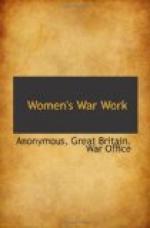Our Co-operative movement is, in a simple way rationing its buyers, by regulating supplies, and it is in voluntary work of that kind, which is going on extensively, and in the people’s own efforts and economies that our great hope lies.
The Ministry of Food arranges meetings and sends speakers to associations and bodies of every kind. The schools are very extensively used for demonstrations to which the parents are invited. The children are talked to and write essays on food and general saving and in these, one little girl of seven told us, “If you don’t throw away your crusts, you will beat the Kaiser,” and another small boy said, “Boys should give up sliding for the war, as it wears out their boots,” and another said, “We should not go to picture houses so much—once a week is quite often enough.” One little child who had been coached at school returned home to see a baby sister of two throw away a big crust and said, “If Lord Rhondda was here, wouldn’t he give you a row.” So the root of the matter seems to be in the youth of our country and the sweetness and willingness of their sacrifices is very fragrant. They sing about saving bread and saving pennies, and to hear a choir of Welsh children sing these songs, with a vigour and enjoyment that is infectious, is quite delightful.
Most of our big girls’ schools have given up buying sweets, and when they get gifts of them send them to the prisoners and the soldiers. We have, of course, restricted our manufacture of sweets very much.
Our school children have, in addition, worked enormous numbers of school gardens and grown tons of potatoes and vegetables.
Our distilleries are taken over by the Government for spirits for munitions and our beer is cut down very greatly. Travelling kitchens go out from the Ministry of Food also and do demonstrations in villages and country districts on cooking and conservation. The Ministry issues leaflets of recipes and instructions in cooking and has a special Win the War Cookery Book. Articles are also published on food values and quite a number of people begin to understand something about calories, even though they are rather vague about what it all means.
Naturally most of the Food speaking and work is done by women though food control and saving is men’s and women’s work.
This year we saved grain by collecting the horse chestnuts, a work that was done by the school children. These are crushed and the oil used for munitions and it was reckoned we could save tens of thousands of tons of grain by doing this.
A wonderful work in the use of waste materials has been the work of the Glove Waistcoat Society, to which American women have kindly sent old gloves. Old gloves are cleaned, the fingers are cut off, the other big pieces stitched together and cut into waistcoats and backed by linenette. These are sold to the soldiers and sailors for wear under their tunics and are most beautifully light and windproof. The fingers of kid gloves are made into glue, of wash leather gloves into rubbers for household use. The big pieces of linenette over are made into dust sheets and the small scraps go to stuff mattresses for a Babies’ Home. The buttons are carded and sold and the making up provides work for distressed elderly women. It needs no funds—it is self-supporting—it only needs old gloves.




